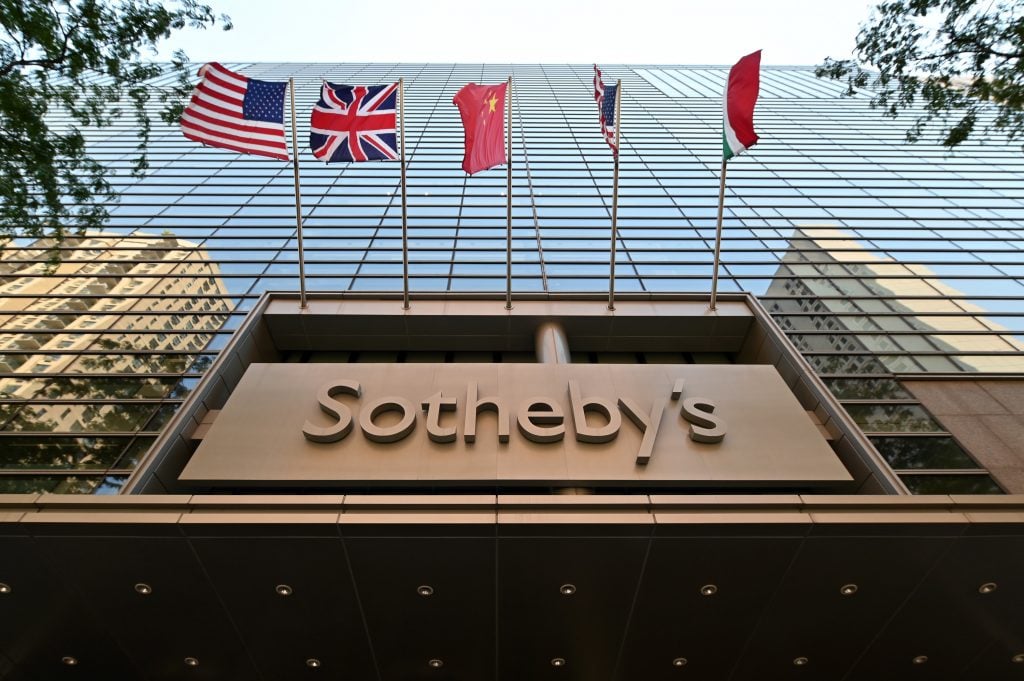Market
Abu Dhabi Sovereign Wealth Fund Acquires Minority Stake in Sotheby’s
The deal inked between ADQ and Sotheby's owner Patrick Drahi will bring a total investment of $1 billion to the house.

The deal inked between ADQ and Sotheby's owner Patrick Drahi will bring a total investment of $1 billion to the house.

Vivienne Chow

Abu Dhabi sovereign wealth fund ADQ has acquired a minority stake in auction giant Sotheby’s, according to an announcement on Friday. Under this agreement, ADQ, together with Sotheby’s owner Patrick Drahi’s additional capital, will bring a total investment of approximately $1 billion to the house.
The announcement did not disclose the percentage of the stake of Sotheby’s that ADQ has acquired nor did it reveal how much the Abu Dhabi company has paid for the deal. But it is understood that ADQ has paid “a majority” of the $1 billion total investment by acquiring newly issue shares of Sotheby’s. The cash will be used “to reduce leverage and support the company’s growth and innovation plans.”
Meanwhile, Drahi, who acquired and privatized the 275-year-old auction house via BidFair USA in 2019 for $3.7 billion, will inject additional capital alongside ADQ to remain Sotheby’s majority shareholder. The combined additional investment is approximately $1 billion. The two companies have signed a definitive agreement.
Founded in 2018, ADQ has a diversified, non-oil portfolio ranging from energy and utilities, food and agriculture, healthcare and life sciences, to real estates and tourism, according to its website. The firm claims that it has contributed around 22 percent of Abu Dhabi’s non-oil GDP in 2023. The investment in Sotheby’s is in-line with the firm’s strategy to pursue investment opportunities “that contribute to the economic diversification of Abu Dhabi,” the statement noted.
The marquee investment will support the house’s growth and expansion in new markets, “establishing an even more robust presence in the Middle East.” The move is in-line with Abu Dhabi’s ambition in arts and cultural development in recent years, which sees the establishment of major museums such as the Louvre outpost in 2017 and the long awaited Guggenheim Abu Dhabi, set to open in 2026.
There has been talk of the French-Israeli collector and entrepreneur to get Sotheby’s back to public trading again in recent years, but it was said that he has been reluctant to do so. As the art market has entered a challenging cycle, Sotheby’s has reportedly made job cuts affecting as many as 50 people in London, and positions in offices across different parts of the world. Sales totals of art auctions in London, New York, and Hong Kong over the past year have shrunk amid a market slowdown.
In June, S&P Global Ratings slashed its credit rating for Sotheby’s from B to B-minus, citing a decline in revenue of 22 percent in the first quarter as sales shrunk and increase in costs, indicating a “negative outlook.” Meanwhile, Bidfair, Sotheby’s parent company, reportedly had $3.5 billion in long-term debt at the end of 2023, according to the Financial Times, based on corporate filings in Luxembourg. The FT also reports that Drahi’s telco empire has been struggling with debt.
But this has not stopped Sotheby’s from launching new initiatives. In April, the house announced its plans to launch new asset-backed security by borrowing about $500 million through bonds backed by personal loans made to art collectors.
Last month, Sotheby’s opened its new flagship retail and exhibition space Sotheby’s Maison in Hong Kong, eyeing on the potential of luxury retail market among a younger crowd. The space consists of “concept store” Sotheby’s Salon where hundreds of works from artwork to jewelry and dinosaur fossils are available for instant purchase.
Meanwhile, Sotheby’s London will present “Hafla” this month to celebrate Middle Eastern art.